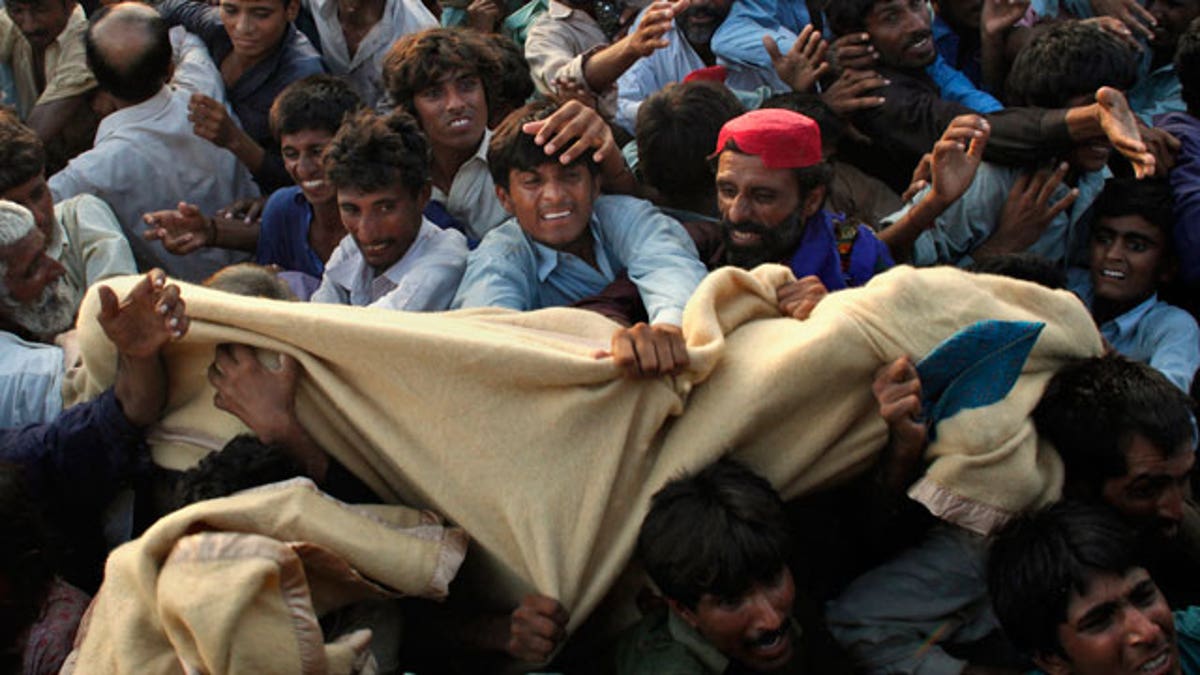
Pakistanis displaced by flooding fight for blankets during an aid distribution by the Pakistani Air Force at a temporary camp set up for residents who had to flee their homes in Sukkar, Sindh Province, southern Pakistan, Thursday, Aug. 19, 2010. (AP)
ISLAMABAD – ISLAMABAD (AP) — Massive flooding in Pakistan has added to criticism of the already-weak civilian government while boosting the image of the military, a potential blow to U.S. and domestic hopes of fostering a strong Pakistani democracy after years of army rule.
Even before the crisis began nearly a month ago, the government faced discontent as power shortages, Islamist militant violence and economic mismanagement plagued the country. A military coup is seen as unlikely, but flooding is so large-scale that some fear political instability in the nuclear-armed nation.
About 20 million people have been affected by the floods across an area bigger than England. Flood victims are far more likely to have seen a Pakistani soldier dropping off relief or picking them up than a member of the civilian government. One state minister's car was pelted with stones after a visit some saw as long overdue, media reports said.
"The overwhelming majority of Pakistanis have always reposed confidence in the army as compared to elected governments," said Mehdi Hasan, a Pakistani political analyst. "People feel the army can do better as it is well trained, it has time and the courage to handle any crisis. It gives an edge to the army over the civil administration."
The army ruled Pakistan for more than half of its 63-year history, thanks to coups that followed periods of political unrest or economic mismanagement by civilian leaders. The government today has been in place less than three years, after nearly a decade of army rule by then-Gen. Pervez Musharraf.
But the army has retained tremendous independence, to the point where many Pakistanis speak of the government and the military as separate entities. It also has steadily regained the popularity it lost during Musharraf's tenure. In 2009, its operations against the Taliban in the Swat Valley and South Waziristan tribal region had broad public support.
The civilians' initial response appeared chaotic and confused as the flooding disaster unfolded. But symbolism seemed to matter more: President Asif Ali Zardari's decision to visit France and England as people fled their water-filled homes infuriated many and burnished the image of an out-of-touch political elite.
More recently, the front pages of Pakistani newspapers have been filled with bickering between the ruling party and the opposition over how flood relief should be monitored, and whether additional layers of bureaucracy should be established to oversee the aid.
The army has been stretched by the crisis, too, but it has exhibited more discipline and message control. It is the only institution in Pakistan capable of large-scale relief work, with some 60,000 troops involved in helping flood victims. It is also running numerous relief camps and delivering aid to the stranded.
Nisar Ahmed, 26, and his father first sent the women and children in their family away with army rescuers. Eventually, the water got too high for them to stay and protect their home in Hamdani Legari village of Sindh province. The men used a tractor to trek 2.5 miles (4 kilometers) in the water to a large dirt embankment where an army truck was distributing food.
"Of course, it is the army helping the people. The government never helps at a bad time," Ahmed said. "We only see politicians when they come here to ask for votes, but then they disappear."
Earlier this month, crowds threw stones at junior economic affairs minister Hina Rabbani Khar's convoy when it arrived in her flood-hit constituency in Muzzafargarh district of Punjab province. Had she bothered to visit before, the residents said, they would have asked her to do something about breaches in a nearby canal, Dawn newspaper reported.
Army spokesmen could not immediately be reached for comment. Pakistani civilian leaders, however, insist they are doing their best to deal with a calamity that would have overwhelmed many governments.
Pakistan's ambassador to the U.S. said hostile segments of the local press have whipped up imaginary tensions between the army and the civilian leadership. The ruling party enjoys excellent relations with the generals, Husain Haqqani said, downplaying the possibility of a government fall.
"Notwithstanding our history, our military recognizes the need for maintaining the primacy of the constitution," said Haqqani.
Most countries use their military in times of natural disaster — it has helicopters, boats and the manpower to help. Even the U.S. experienced failures in dealing with just one flooded city, New Orleans, during Hurricane Katrina, observers say.
But asked who is in charge of relief — the army or the civilians — and talk is of cooperation, not chain of command.
"It's a partnership," said Salman Taseer, the governor of Punjab province. "The civilian government is raising international funds. The civilian government is providing a lot of support. The army has, of course, the logistical ability. I think it's a great example of civilian and army working together."
The U.S. has tried to shore up Pakistani democracy, seeing it as a means of ending popular support for Islamist militants and empowering ordinary citizens. A five-year, $7.5 billion U.S. aid package for Pakistan is partly aimed at strengthening civilian institutions in the country.
During a visit to Pakistan on Thursday, U.S. Sen. John Kerry said the flooding crisis could present an opportunity for the civilian government to build capacity and improve its skills — a "silver lining" to the tragedy.
"Crisis often strengthens a government," he said.
___
Associated Press writers Tim Sullivan in Kachero and Munir Ahmed in Islamabad contributed to this report.
